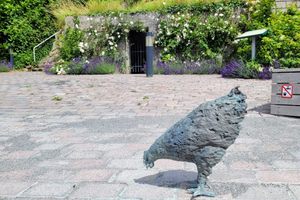
Hønekilden (The Hen Spring) in Sønderborg, southern Denmark, was once renowned for its pure water—so much so that, in the 1500s, Queen Dorothea had it channeled through hollowed-out tree trunks to her castle’s waterworks. Locals trusted it above all other sources for cooking. Although its outlet remains visible today behind a wrought iron gate, the water is no longer drinkable.
Legends surround the spring, especially in the neighborhood, where residents claimed that local newborns weren’t brought by storks but were "found swimming in the spring." In 1924, Widow Larsen of Sønderborg recalled how, as a child around 1845, she and her friends would hide by the spring, hoping to catch a glimpse of these mysterious babies—but their curiosity was never satisfied.
The spring was also linked to other forms of magic, with some believing its waters held the power to aid fertility. It was said that if a woman struggled to conceive, simply stepping over the spring’s water could lead to pregnancy.
Then there’s the haunting tale of a young girl who, on Three King’s Day, hoping to catch a glimpse of her future husband, peered into the spring—only to see her own image, shrouded for burial. She confided her fright to a friend, but that same night, terror overwhelmed her, and she was found dead the next day in the harbor’s icy waters.
In 2016, a new water feature was added beside the legendary old spring, creating a small plaza in front of it. Sculpted by Vibeke Fonnesberg, the piece includes trickling water taps and a rooster with three hens cast in bronze—a playful nod to the spring’s name; Hønekilden.

Post a Comment